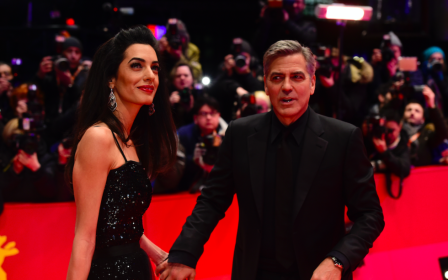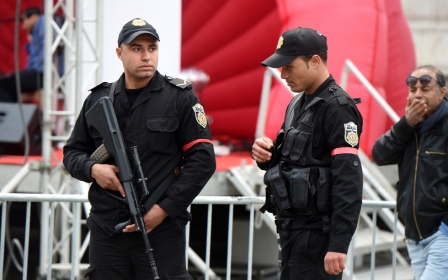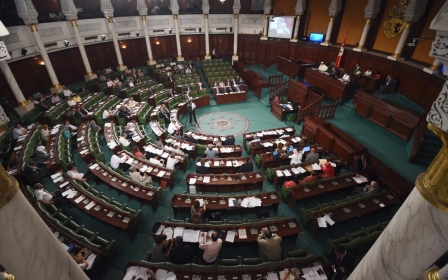For the martyrs: Actor uses prize to salute Tunisian revolution
Majd sat in his chair, listening to the speeches of one award winner after another. Finally the presenter for best actor award strolled to the podium and spoke into the microphone: “I’m thrilled to give the silver bear for best actor to Majd Mastoura, for his leading role in Nhebek Hedi.”
In that moment, 24-year-old Mastoura made history by becoming both the first Arab and first Tunisian to win the best actor award at the Berlinale Film Festival. As the spotlight shone down on him, he took the opportunity to shift the focus away from himself onto something bigger.
“I would like to give this gift to the great Tunisian people and all the martyrs of the revolution!” Rapturous applause echoed throughout the room and Mastoura continued: “There wouldn’t have been liberty of expression without all the blood that was shed during the revolution. I hope we will continue to be free, happy, and continue to produce good art. Thank you Tunis. Shukran Tunis.”
'Watching the video brought tears to my eyes'
Fast forward two weeks later. Mastoura, his neck draped with a scarf and a small hoop earring hanging from his ear, relaxes in a cafe facing the Mediterranean Sea in La Marsa, a northern suburb of Tunis. Sipping from a glass of mint tea with almonds, he shares what the past two weeks have been like: “I just figured out that Facebook filters messages from people you aren’t friends with. I went into my message request category and had hundreds! It’s taken me so long to respond. I still haven’t finished.”
Majd is too modest to say it upfront, but the reality is that he has become an instant celebrity in Tunisia. His award ceremony speech went viral on Tunisian social media and the fact that he dedicated the award to the Tunisian people and martyrs of the revolution resonated with many across the nation. Faten Guermazi, a 32-year-old architect, says: “Watching the video brought tears to my eyes. I’m sure any Tunisian would say the same thing.”
His message came at a particularly tumultuous time for Tunisia, which has experienced three major Islamic State (IS) group attacks in the past year. On top of that, unemployed activists in the neglected interior city of Kasserine continue to stage a sit in at the local governorate, demanding public sector jobs. These same young activists took to the streets in February, chanting the same slogans - work, freedom and dignity - as those who had come before them in December 2010 and January 2011, during the revolution which overthrew Tunisia’s dictator Zine al-Abedine Ben Ali.
This sequence of events placed Mastoura at centre stage and let Tunisians all around the world know that the revolutionary dream of a free and open Tunisia was still alive. On a more personal level, Mastoura’s own story is fascinating and his winning of the award seems almost pre-destined.
Family origins
His family originally hails from the northern city of Bizerte, an area of Tunisia famous for its relaxing ambience. Ironically enough, men from Bizerte happen to make up one of the largest portions of Tunisian IS fighters in Syria and Iraq. His father was a career military officer, so although Mastoura’s origins are in Bizerte, he spent much of his childhood bouncing from one home to the next throughout Tunisia. His mother continues to work as a classical Arabic teacher and exposed him to both theatre and literature as a child.
As soon as Majd learned to write, it became his passion. He inhaled works by Khalil Gibran, Naghib Mahfouz, and many Tunisian writers. With his love of the written word, Majd also benefited from his father’s military inclinations. “My dad always liked to talk about politics and news,” he tells Middle East Eye. Majd himself knew something was awry in his home country, as he spoke freely about politics at home. But whenever he was with friends outside or in the classroom, he was always hushed by his peers. His opinions could have gotten him into trouble.
Political dissent
In 2008, miners rose up in the industrial town of Gafsa after the jobs they had been promised were given to citizens from other cities who happened to have connections. This recurrent theme of discontent among unemployed Tunisians inspired Majd to write in his mother tongue of Tunisian Arabic. This marked his first time writing in Tounsi, which is the name of Tunisia's colloquial language. He wrote only for himself during the 2008 protests, then began submitting his works to writing competitions in 2009. He won awards, and although he may not have admitted it to himself at the time, he had a natural gift for expressing himself.
Then in December 2010, Mohamed Bouazizi, an unemployed man supporting his family as a vegetable merchant, set himself on fire, sparking the Tunisian revolution. Majd tried to initiate a protest in his mathematics high school, but most of the students were afraid of what would happen if the revolution failed. Instead, Majd demonstrated in the streets of his hometown of Bizerte. He also started writing in Tunisian Arabic again, furiously and emotionally putting pen to paper.
In January 2011, Ben Ali fled the country and Majd stayed actively involved in the revolutionary movement. It was not until the Autumn 2011 elections - during which most of the “true revolutionaries were not elected,” and instead most of the parliamentary seats went to members of Ennahdha and other politicians who he felt did not represent the revolution - that Majd became disillusioned. “I felt deceived. That’s why I moved into the arts, where one can continue the revolution on an individual level.”
At the same time, he enrolled in university to study computer science. As talented as he was in the fields of writing and acting, which he began at the age of 12, the day-to-day pressure to live a stable life overshadowed his other desires. On the side, he continued in the arts, but grappled with the dichotomy of his double life.
In 2012, he started “Street Word” with his close friend Amine Gharbi. It became the first inclusive and open spoken word event in Tunisian Arabic. The two of them hosted 50 programmes of the series on different streets of Tunis. This lasted until 2014, however, in 2013, Majd starred in his first feature film, Bidoun 2, which was the only Tunisian movie nominated for best picture at that year's Tunisian film festival.
Nhebek Hedi
In the beginning of 2015, Majd went to the auditions for Nhebek Hedi, a Tunisian movie about an introverted car salesman set to marry a woman he did not love, who meets an entertainer at a hotel and falls in love with her. Majd landed the role and developed a close professional relationship with the director Mohamed Ben Attia, whom he also thanked in his acceptance speech.
The experience was not without challenges. Mastoura, whose favourite actor is Al Pacino and favourite movie is The Godfather, admits: “I had issues with the physical aspects of the character. My voice is naturally very loud and I’m also quite extroverted. Hedi’s voice is much softer and he is quite restrained. Mohamed even had some serious doubts at certain points about whether I would be able to change my voice.”
Majd eventually did figure out Hedi’s voice and shared it during our time at the cafe. Compared to his actual voice, which buzzes with confidence, his Hedi voice is quite soft and almost inaudible.
The movie, set to premiere in Tunisian theatres on 14 March, also garnered the best first film award at the Berlinale festival. For now, Majd is focused on the premiere of the film and will be busy travelling to different theatres across Tunisia presenting it to cinema goers. Once he finishes all of the work on the premiere, he will head back to Montpellier, France, where he studies drama. After he finishes drama school in June, he plans to apply to acting school in Paris, as his ultimate goal is to establish himself in French cinema.
Crediting others for his success
“I see myself between France and Tunisia for the next three years. I love Mediterranean weather. After that, I want to explore the world and I am open to all different opportunities,” he explains, idealism shining in his eyes.
As we wrap up our conversation, MEE ask Majd if there is anything else he would like to say. “Yes,” he responds. “I want to reiterate just how important my parents have been for my development. They are my number one supporters.” He then goes on to list a variety of other important people in his life, almost as if he is accepting another award. He thanks his first drama teacher - who opened him up to the world of acting - and gives credit to his director Ben Attia for giving him a chance as Hedi.
What is so striking about Majd is that even though he has become a celebrity in Tunisia, he still remains humble and cares about the community. Malek Khenissi, a 26-year old master’s student of geology, feels inspired by Mastoura. “The guy is such an inspiration to every single young Tunisian, during such a hard time for our country,” he tells Middle East Eye.
On top of his patriotic dedication to the citizens of Tunisia, he speaks a great deal about the individual people who supported him in one way or another throughout his life. It is this humbleness, combined with confident idealism, that gives Tunisia much hope for the future.
Recognition of the importance of the revolution remains integral to Mastoura’s identity. “Without the revolution, I would probably be working in the IT field. Revolutions are amazing because they not only change countries, but they also give people the confidence to individually change themselves.”
He pauses for a moment before finishing, “Even though there are flaws with my country, I still love it and know that a better future is there for the taking for the younger generations.”
New MEE newsletter: Jerusalem Dispatch
Sign up to get the latest insights and analysis on Israel-Palestine, alongside Turkey Unpacked and other MEE newsletters
Middle East Eye delivers independent and unrivalled coverage and analysis of the Middle East, North Africa and beyond. To learn more about republishing this content and the associated fees, please fill out this form. More about MEE can be found here.




